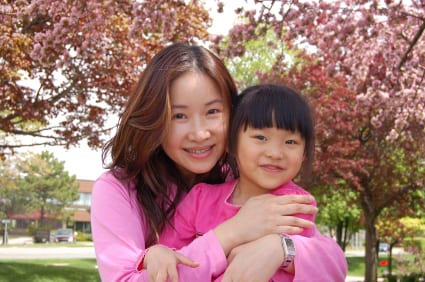"A lot of people wonder how Chinese parents raise such stereotypically successful kids. They wonder what these parents do to produce so many math whizzes and music prodigies," writes Amy Chua in her provocative new book ‘Battle Hymn of the Tiger Mother’. "Well I can tell them because I’ve done it." And, with that statement, Chua sparked a rather heated debate about whose parenting style is best – Eastern or Western mothers?
An excerpt in the Wall Street Journal under the headline "Why Chinese Mothers are Superior", which by the way Chua did not write, has created much controversy and has generated more than 4,000 comments on wsj.com and nearly 1000,000 comments on Facebook.
In her book, the mother of two discusses how she was raised by extremely strict but loving Chinese immigrant parents and how she adopted those principles in her own parenting techniques.
Chua tells Time magazine that the story that is getting the most reaction involves a lackluster birthday card from one of her daughters:
"My kids were maybe seven and four and my husband had forgotten my birthday so at the last minute we went to this mediocre Italian restaurant and he said “O.K., girls you both have a little surprise for mommy.” And my daughter Lulu pulls out a card, but the card was just a piece of paper folded crookedly in half with a big smiley face and it said Happy Birthday Mom. And I looked at it and I gave it back and I said “This isn’t good enough. I want something that you put a little bit more time into.” So I rejected her birthday card. People can’t believe I rejected this handmade card. But she knew as well as I did that it took her about two seconds to do it."
When asked by the WSJ if she believed strict Eastern parenting is really superior, in terms of producing happy, well-adjusted and successful adults, Chua said: "[I’ve] taught law students of all backgrounds for 17 years, and I’ve met countless students raised the “tough immigrant” way (by parents from Pakistan, India, Nigeria, Korea, Jamaica, Haiti, Iran, Ireland, etc.) who are thriving, independent, bold, creative, hilarious and, at least to my eyes, as happy as anyone. But I also know of people raised with “tough love” who are not happy and who resent their parents. There is no easy formula for parenting, no right approach (I don’t believe, by the way, that Chinese parenting is superior – a splashy headline, but I didn’t choose it). The best rule of thumb I can think of is that love, compassion and knowing your child have to come first, whatever culture you’re from. It doesn’t come through in the excerpt, but my actual book is not a how-to guide; it’s a memoir, the story of our family’s journey in two cultures, and my own eventual transformation as a mother. Much of the book is about my decision to retreat from the strict “Chinese” approach, after my younger daughter rebelled at 13."
All this attention on Chua’s book made us wonder about our own readers. How were you raised and have you adopted those same principles in your own parenting? How much do you think culture affected your upbringing?





